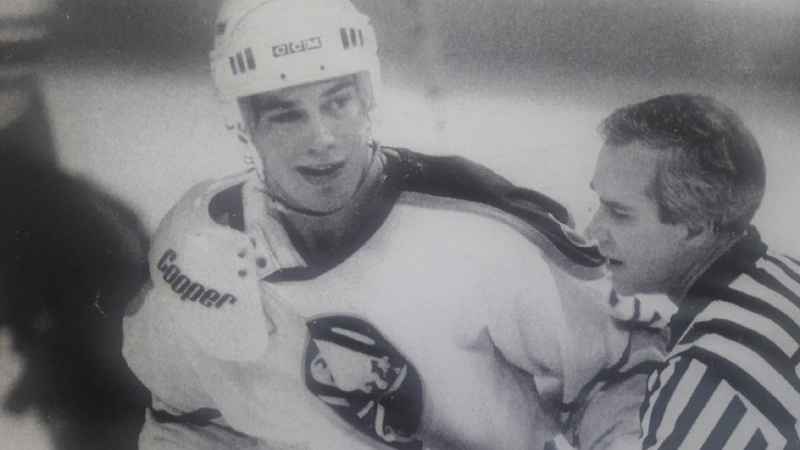Family of Late Minnesota Hockey Star Waiting for Results from CTE Lab
[anvplayer video=”4334122″ station=”998122″]
Jeff Parker’s brain is sitting in an industrial-size freezer at the VA hospital in Boston.
There are 12 freezers inside the hospital laboratory, each containing at least 150 brains. In the coming months, Parker’s brain will be thawed, sliced into tissue samples, and covered with a chemical stain used to identify any abnormalities.
This is how researchers will determine if the former hockey star from White Bear Lake suffered from a degenerative brain disease called Chronic Traumatic Encephalopathy, or CTE.
Parker’s family donated his brain to the Boston University CTE Center last year after he died from unrelated health issues. 5 EYEWITNESS NEWS was one of only a few news organizations in the world to be granted access to the CTE Center.
The Center’s research has led to the discovery of CTE in athletes like Minnesota Wild enforcer Derrek Boogaard, Hall of Fame linebacker Junior Seau and former New England Patriot Aaron Hernandez.

Jeff Parker
Dr. Ann McKee inside the brain bank at the VA hospital in Boston, Massachusetts.
Their discoveries helped pressure the National Football League into reaching a $1 billion settlement with former players last year and is the backbone of a class action lawsuit against the National Hockey League currently pending in federal court in St. Paul.
Before his death, Parker joined the lawsuit which accuses the NHL of downplaying the consequences of concussions and repeated head trauma; consequences that Parker’s brother, Scott Parker, said became abundantly clear in Parker’s final years. {RELATEDSTORIESRIGHT}
KSTP’s ‘Fighting Back’ Investigation
"I know he struggled. I could talk to him every day and I’d hear the same story," Scott Parker said. "But I listened even if it was the same story."
Jeff Parker and his two brothers grew up playing hockey on outdoor rinks in White Bear Lake. All three boys played collegiately, but Jeff Parker was different. By the time he was 22, Jeff Parker was playing in the NHL, starting his career with the Buffalo Sabres in 1986.
"He probably made in two weeks what I made in a year," Scott Parker said with a laugh about his brother’s early financial success.
But after 137 games over five seasons, Jeff Parker’s career abruptly ended in 1991 when he suffered a concussion during a violent collision with the boards.
Jeff Parker said he remembered his head "went oblong."
Jeff Parker started his NHL career playing for the Buffalo Sabres in the early ’90s.
Now a high school hockey coach in Chippewa Falls, Wisconsin, Scott Parker said his brother returned to Minnesota a different man after the injury.
"I don’t think people realize how difficult that is when you see a guy playing against the Minnesota North Stars one year, and the next year, he’s walking aimlessly in St. Paul," Scott Parker, who now hangs his brother’s jersey in his team’s locker room, said. "Something’s got to be there. Something isn’t right."
Last spring, Jeff Parker described his ongoing struggle in an interview with 5 EYEWITNESS NEWS.
Extended Interview: Jeff Parker, Former NHL Player from White Bear Lake
He was working at a little bar off Rice Street on St. Paul’s east side. The bar was dark and the schedule was flexible. It was a good fit since Jeff Parker said he suffered from light sensitivity, headaches and memory loss.
"I always thought it would kind of go away," he said about the consequences of that career-ending collision. "I wouldn’t wish that on anybody to get a concussion like the one I had. It’s awful."
That spring, less than three miles from where Jeff Parker tended bar, attorneys representing the NHL gathered on the seventh floor of the federal courthouse in downtown St. Paul. They were in town to try to discredit Boston University’s CTE research methods.
NHL Commissioner Gary Bettmann has said the science behind CTE is inconclusive, and that it’s premature to warn players about the potential consequences as they relate to hockey.
Dr. Ann McKee, chief of neuropathology at Boston’s VA hospital and director of the CTE Center, dismisses the league’s claims as profit-driven denials of science.
"If you’ve got a vested interest in this problem not existing, I’m never going to turn those people around … but the evidence is overwhelming," McKee told 5 EYEWITNESS NEWS during an interview last month inside her lab.
Dr. Ann McKee shows the results of former New England Patriots player Aaron Hernandez’s brain, which displays CTE.
McKee said that evidence is expanding beyond the game of football.
"We’re getting more and more brain donors that were hockey players," McKee said.
In January, the family of Andrew Carroll, a former hockey standout at the University of Minnesota-Duluth, donated his brain to McKee’s team after Carroll committed suicide.
McKee said a CTE diagnosis often helps families who have spent years struggling to cope with drastic swings in behavior, mood and temperament brought on by the degeneration of the brain.
In the coming months, McKee will open the freezer door in Boston and remove Jeff Parker’s brain. She will slide samples under the microscope to look for signs of degeneration and possibly find answers to the Parker family’s struggle.
"Somehow knowing there was a disease that’s responsible … that’s an enormous relief to the family."